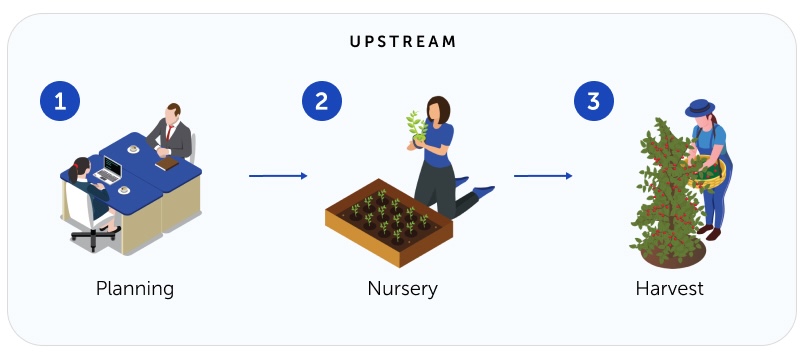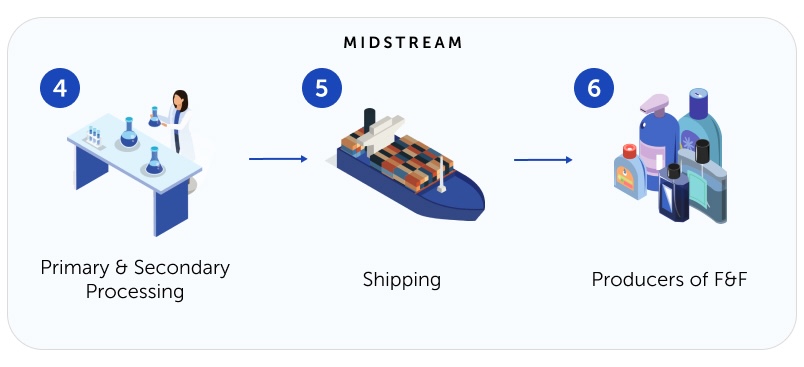
Agroforestry & Non-Timber Forest Products
Where living forests become livelihoods, and sustainability becomes prosperity
Standing forests or productive farmland? Why not both?
That is the simple premise of agroforestry, a regenerative farming approach that for millennia has allowed communities and nature to coexist and benefit from one another.
At Indika Nature’s Telaga Mas Kalimantan site, our 18-hectare experimental plot hosts various agroforestry initiatives in search of those that maximize productivity for farmers, conservation for nature, and carbon sequestration for the climate. A core part of the solutions we are exploring are non-timber forest products (NTFPs) — beekeeping, for instance, or incense gathering — that give communities an incentive to keep the forest standing. And with a focus on social forestry, we help small farmers achieve the agency and empowerment to make a better life for themselves and their families.
Turning living forests into sustainable livelihoods
Through its unique combination of sustainable land management and resilience-building techniques, agroforestry contributes to food security, rural development, and environmental sustainability.

Upstream
Each agroforestry initiative begins with meticulous research, feasibility studies, and validation of suitable locations and methodologies by Indika Nature, through Telaga Mas Kalimantan. This ensures sustainability and maximizes yield. Examples include cultivating high-value patchouli and citronella to supply Natura Aromatik Nusantara.
We establish specialized nurseries to grow high-quality seedlings and saplings of selected commodities, ensuring a reliable and sustainable supply for plantation activities. To date, these include patchouli, citronella, vanilla, ylang-ylang, coffee, sugar palm, kemiri sunan (Reutealis trisperma), and gliricida (Gliricidia sepium).
Our field management practices prioritize regenerative techniques ranging from how we irrigate to the use of biopesticides and biofertilizers, to soil conservation measures. This ensures healthy growth and development of the crops, which are later harvested using sustainable techniques to minimize environmental impact and maximize the quality of the raw commodity.

Midstream
The harvested plant materials undergo primary processing that may include distillation or drying to extract the essential oils and aroma compounds present in the raw botanicals. Our subsidiary, Natura Aromatik takes charge of the secondary processing stage. Here, sophisticated fractioning and isolation processes extract specific aroma chemicals, while purification methods refine essential oils, and extraction techniques produce functional extracts.
Aroma chemicals, essential oils, and extracts are efficiently transported from production to distribution centers. From there, they are distributed to various customers, including fragrance, flavor, cosmetics, and personal care product manufacturers, serving diverse industries and consumer preferences.
Our Subsidiaries
Together we drive innovation and sustainable solutions for a better tomorrow

Lokasi
Solo, Central Java
Sertifikat




Natura Aromatik Nusantara is one of Indonesia’s premier companies producing top-quality aromatic chemicals, essential oils, and extracts sourced from native Indonesian raw materials. Our commitment to excellence has made us a top 4 exporter, with various certifications to meet the exacting standards of overseas markets. Today, we have a diverse customer base of more than 120 major clients in the flavor and fragrance industries across 16 countries. From our base in Solo, Central Java, our 1.3-hectare factory boasts state-of-the-art production technology, including a fractionation capacity of approximately 120 tons per month.

Lokasi
Jakarta
At Laras Ekosistem Organik, we’re committed to sustainable practices and ecological harmony through organic ecosystem management. Nestled in Indonesia’s pristine landscapes, we prioritize organic cultivation with minimal environmental impact. Through regenerative agriculture and natural resource conservation, we boost biodiversity, soil health, and community well-being. And with organic farming techniques and strict environmental compliance, we foster a symbiotic relationship between humanity and nature, delivering high-quality organic products to consumers.


